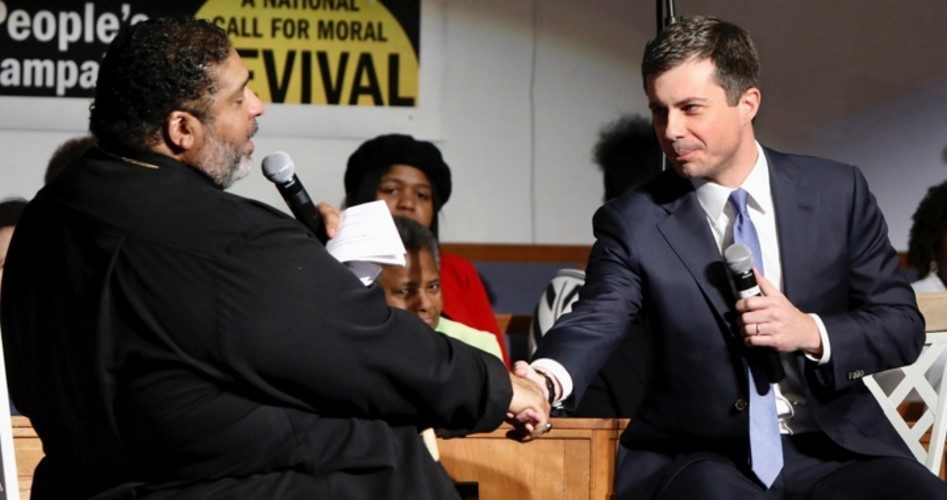
Believing your nation is illegitimate and perhaps should cease to exist shouldn’t be a résumé enhancer for a prospective leader. But presidential candidate Pete Buttigieg may disagree, as he recently expressed approval at the notion that the United States occupies stolen land — and that illegal aliens are merely exacting justice by “reclaiming” it. Moreover, Buttigieg actually asserted that illegals are “subsidizing everybody else.”
As Breitbart reports, “Mayor Pete Buttigieg on Sunday listened and nodded without disputing a claim from Pastor William Barber that illegal immigrants from Mexico were merely reclaiming land from the United States.”
“‘We call people illegal aliens.… Why can’t we just own in America that some of the people that are trying to come from Mexico here are coming back to land we stole?’ he asked,” the site continues. “And the reason we took the land is because people wanted to keep their slaves?”
Breitbart also writes that “Barber urged Buttigieg, as a presidential candidate, to give more speeches about the ‘lies’ of history that kept Americans divided” (video below).
In truth, Barber was peddling not only divisive lies of history, but also of current events — with Buttigieg’s agreement.
For example, after the pastor claimed that illegals “benefit this country” and mentioned the “taxes they pay,” the South Bend mayor chimed in saying that illegals “are in many ways, like Social Security, subsidizing everybody else.” In reality, a recent study showed that deporting all illegals would save us $622 billion yearly; that’s almost two-thirds our current budget deficit.
Returning to the “stolen land” matter, though, since Barber insisted that we “have to have some historical clarity around these issues,” let’s oblige him.
Accepting the stolen-land premise for a moment, a question: How does letting South Americans and Mexicans take American land help, and deliver justice to, North American Indians?
The obvious point, of course, is that those Indians were the original inhabitants of the lands in question.
In fact, “Mexico” is essentially a European creation whose people speak a European language. It was born of a colonizing European power, Spain, and was not originally “Mexico.” It was merely part of the “Viceroyalty of New Spain,” a vast area encompassing territories in North America, South America, Asia (e.g., the Philippines), and Oceania.
Note, too, that Mexico is named after Mexico City (not the other way around), which in pre-Spanish times was Tenochtitlan, the capital of the Aztec Empire. It was given its current name by the European conquerors — and became the Viceroyalty of New Spain’s seat — sometime after the Aztec’s defeat in 1521. So perhaps Mexico, that imperialism-born social construct occupying stolen land, should be reclaimed by the Aztecs.
The independence of the “Mexican” part of New Spain, in 1821, was followed by the first recorded use of “Mexico” as a country name. It was also followed by conflict with North American Indians (who’d battled the Spanish as well) such as the Apache and Comanche, who didn’t appreciate the interlopers’ presence.
The Mexicans could be brutal, too. Example: The government of Mexico’s state of Sonora once offered a 100-peso bounty for each scalp of a male Apache age 14 or older.
Note also that while the Mexicans never bought the Indians’ land from them, we did purchase California and the Southwest from Mexico, via the Treaty of Guadalupe Hidalgo (1848) and the Gadsden Purchase (1854).
But, oh, how different history could have been! Had the Mexicans just retained their stolen land, the Indians could, as so many south of the border do, be living in the terror engendered by the brutal Mexican drug cartels.
Of course, the even deeper issue of “stolen land” is a non-starter. China fought its Wars of Unification, in which many groups were conquered and their lands taken; the Japanese dominated and have largely subsumed their islands’ original inhabitants, the Ainus; the Taiwanese took the aboriginals’ Formosa; Shaka Zulu warred against and conquered other south African tribes; and the Franks (Carolingian Empire) vanquished numerous European groups, such as the Lombards, Avars, and Saxons. That is the story of man. Should we now endeavor to redraw borders and relocate peoples and somehow try to determine who belongs on what where?
Three more points:
• American Indians often fought among themselves and sometimes seized other tribes’ land. As Harvard psychologist Steven Pinker demonstrated in 2007, pre-state life (including Indian society) was a “war of all against all,” to quote 17th-century philosopher Thomas Hobbes.
• The Indians were not the first Americans. Ernie LaPointe, great-grandson of Sitting Bull, related this fact in 2010 when responding to Barack Obama’s inclusion of the famed Indian in a “great Americans” children’s book. He said that Sitting Bull “never was an American” but “a Lakota.” Obviously. “America” is a European-derived word, taken from Italian explorer Amerigo Vespucci’s name; “America” is also a Western concept and the United States a Western creation.
• We are not a nation of immigrants — we’re a nation of citizens. Do we call Japan or Taiwan a “nation of immigrants” because their current populations descend almost exclusively from people who hailed from elsewhere? Are American Indians “immigrants” because their ancestors originally came from Asia? The nation-of-immigrants line is divisive and destructive, undermining our claim to nationhood.
Barber is right about one thing, however: Historical (and definitional) clarity is imperative. After all, as George Orwell observed, “The most effective way to destroy people is to deny and obliterate their own understanding of their history.”
Tragically, though, whatever Buttigieg’s and Barber’s understanding of American history, more damning still is the fact that they may not even consider that history their own.
Selwyn Duke (@SelwynDuke) has written for The New American for more than a decade. He has also written for The Hill, Observer, The American Conservative, WorldNetDaily, American Thinker, and many other print and online publications. In addition, he has contributed to college textbooks published by Gale-Cengage Learning, has appeared on television, and is a frequent guest on radio.



